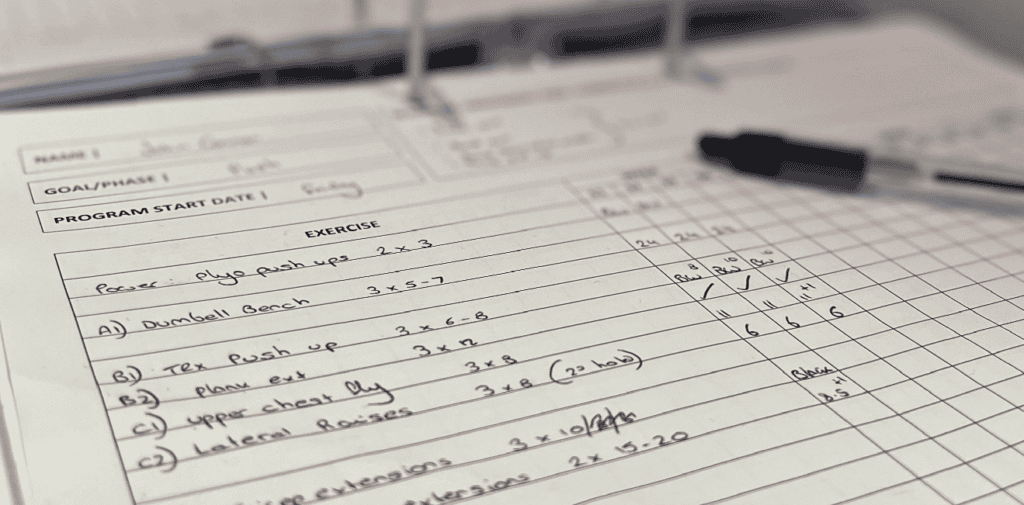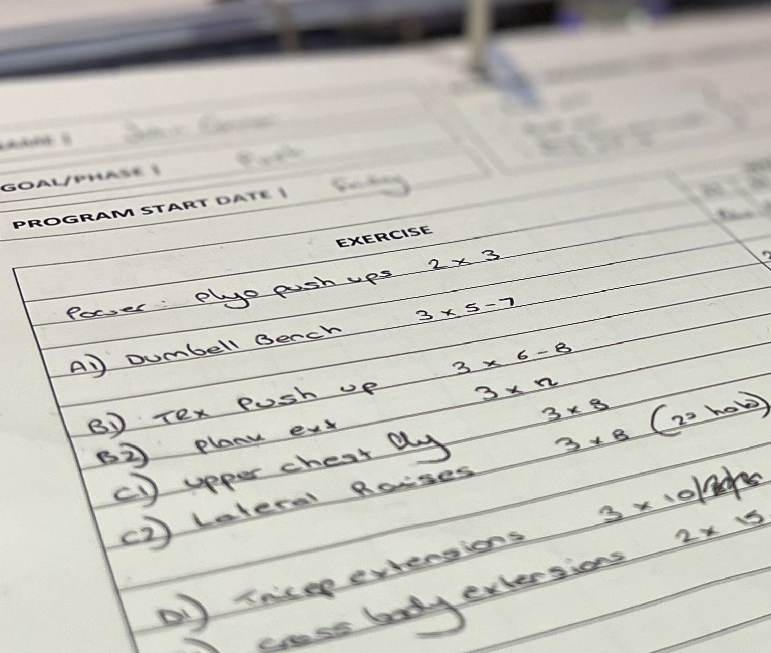There’s a lot of conflicting advice online about how much exercise you should do daily or weekly if you want to lose body fat.
As with everything relating to your health, there’s no quick and simple answer. However, there is plenty of science and psychology to think about.
In this blog, we’ll take a deeper look at the question – including the variables to consider. We’ll conclude by putting together a typical week’s activity that is an amazing goal to aim for if you want to lose weight. However, it’s important to remember that everyone’s different – so even just putting a plan together that will take steps towards this kind of activity is a fantastic way to begin a meaningful weight-loss journey…
Do I need to exercise every day to lose weight?
Exercise comes under the energy expenditure category and in order to lose weight our energy expenditure needs to be higher than our energy intake. So we need to be burning more calories than we are eating.
One way to do this is to increase the amount of time we spend moving.
Exercise can be split down into different categories. Low intensity, high intensity, Strength, Power, Endurance etc…. Just to name a few. Everyone’s low and high intensities will be different. For some, low intensity is an easy 5k park jog, for others it’s hitting their step count for the day via different methods such as taking the stairs instead of the lift or heading out for a 20 minute walk on their lunch break.

However, it is important that some form of exercise is done daily to create good habits around movement and energy expenditure. If, throughout the week, you have a mixture of low intensity, high intensity and strength training, you won’t be going far wrong in reaching your goals.
How much exercise do I need to do each day to lose weight?
Quick answer – It depends…. Which is the answer everyone hates, but it really does.
You can be doing all the exercise in the world but if your calorie intake is still higher than your energy expenditure, you will not lose any weight.
Having said that, there are things we can do daily and take accountability for to build a great foundation of habits, that in turn can lead to great weight loss results and a complete change of mindset when it comes to exercising and moving in general.

On a day-to-day basis, we should be aiming to move as much as possible which can be extremely difficult for some. Those that have desk jobs are unlikely to move as much as someone who has a more labour intensive job. However low intensity movement can be done daily and can be completed effectively by most with a few tweaks to daily habits.
10,000 steps is the equivalent of about 400 calories burned and has been a government guideline for many years now as a target for everyone to be hitting daily (this is an estimate and will change slightly per person).
And when I say steps, I literally mean every single step you take with your feet. From your desk to the kitchen and back. That standing and talking meeting where you circle the meeting room or your living room whilst chatting. The stairs you took up to the 4th floor of the office or instead of the escalator or lift in the train station. They all count and they all add up.
Daily steps are the very first step (no pun intended) in regards to your habit foundations that you can then build on and work towards your weight loss goals. Every 24 hours is a new day and a new start.
Think about an activity tracker
Most phones these days track your daily steps, however they can be quite inaccurate as you are unlikely to have your phone on you at all times of the day. It can be left on the desk when you pop to the printer across the office – so it misses out on collecting every single step you take and in turn vital information to keep you on track with your goals.

I would always recommend an activity tracker watch. These start at £10 for a simple step tracker and head up to £800+ for the GPS Go-Go-Gadget type extravaganza…. You choose your equipment of choice but as long as it’s on your wrist from the minute you wake up to the second you go to bed, you will be collecting vital information that is reliable and will keep you accountable.
For some, 10,000 is a lot of steps to get in in a day. We all have different jobs and responsibilities, so always feel free to target a lower number and gradually build it up as new habits are created. For others 20,000 is a more realistic step target for the day. Postmen and women vs a corporate lawyer – for example – will have extremely different looking 24 hours and in turn step counts and targets.
How to add steps to your daily routine
Some tips on how to add steps into your day to day routines:
- Take the stairs to your desk in the morning
- Take the stairs too and from breakfast/lunch/dinner
- Take the stairs too and from meetings/ meeting rooms
- Get off a tube/train/ bus a stop earlier or get on one further down the line?
- Walk up escalators from tube/ train
- Use a printer furthest away from your desk
- A 10 minute walk around the block before sitting down on your lunch break
- Walk and talk meetings
- Park in the furthest spot from your work entrance or the entrance to the supermarkets etc
If you are further along in your fitness and weight loss journey and you are completing your daily steps without any problems, this is when we can add in some Strength or high intensity training.
How much exercise per week to lose weight?
When looking at your week, you should have daily targets and a weekly target. If we look ahead at the next 7 days it can make things easier when planning out our exercise. Let’s imagine a Monday-Sunday week. If you know you will be away for the weekend or out and about with friends or family and you know you won’t have time to do any exercise those 2 days, then you need to make sure you are still reaching your target of weekly movement in the 5 days previous and use the weekend as recovery days. If you don’t plan ahead and look at the week as a whole it could mean you have zero to minimal time to exercise because you haven’t planned in advance and run out of hours in the week. You will become a lot more time efficient.
“By Failing to prepare, you are preparing to fail.”
Benjamin Franklin
What does a great week look like?
If your normal week consists of the following:
- Monday: 10,000 steps and Strength Session
- Tuesday: 10,000 steps
- Wednesday: 10,000 steps and Strength Session
- Thursday: 10,000 steps and Strength Session
- Friday: 5k Run
- Saturday: 10,000 steps and Strength Session
- Sunday: 10,000 steps
But you know in advance that your targets on the Saturday and Sunday will not be reached, your new week could maybe change to look like the following:
- Monday: 12,000 steps and Strength Session
- Tuesday: 12,000 steps and Strength Session
- Wednesday: 15,000 steps
- Thursday: 12,000 steps and Strength Session
- Friday: 12,000 steps and Strength Session
- Saturday: Recovery
- Sunday: Recovery
So you still complete all 4 Strength sessions and 90% of your targeted daily steps, plus enjoying your weekend plans and staying on track with your goals and having enough recovery time to again the following week.

In an ideal week you will have a mixture of low intensity exercise, high intensity exercise and strength training. Your goals, training history and current fitness levels will all play a part in determining what your week of exercising looks like, so always speak to a professional who can help you plan. Everyone’s week and type/amount of exercise will look different. But as long as you are ticking (or working towards ticking) all of the above boxes, you will be on the right track to reaching your goals.
How often should I exercise to lose weight?
Exercising should not feel like a chore and finding a type of energy expenditure that you enjoy will increase participation and long term adherence significantly.
Low intensity exercise/movement should be done daily. Increasing the heart rate and your body temperature slightly as well as increasing blood flow to your muscles should be a daily target. Other types of exercise/ sport/movement are then done around this to compliment your goals, any previous injuries and current fitness levels.
Doing too much too soon can have a detrimental effect, not only to your body but also your enjoyment and adherence. It also depends (sorry) on what your lifestyle currently looks like. Some people have time to train every day, others not so much and that’s ok.
Is it better to workout longer or harder?
As I’ve mentioned before there are many different types of exercise and sport out there that you can do. Finding which you prefer is always optimal as you are more likely to actually do it and stick to it for the long term.

If you don’t enjoy HIIT style training for example or on the other end of that spectrum long arduous runs, you don’t have to do it/them. Finding a type that fits into your lifestyle is also key. Mild/moderate exercise can be done for longer periods of time, whereas hardcore interval training not so much. If you only have 20mins every few days to fit something in you will probably be more inclined to do a higher intensity session.
Also a 45-60 minute personal training session is extremely likely to be more beneficial than a 90 minute self-guided workout. 45-60 minutes of correct technique, correct intensity/volume, correct exercises for you, physiologically means you will work harder as you know what you are doing is right for you. 90 minutes of “not sure if I’m doing this right or what I’m actually doing, but i’ll see” doesn’t quite compare. We all need an expert every now and again to keep us on track and just guide us in the right direction but also to keep us accountable.
If we have a PT session booked and paid for, there are likely to be less excuses floating around during the day as to why you can’t make it. When doing self guided sessions, you have no one to be accountable to apart from yourself which can make adherence a lot lot harder.
If you’d like to know more about how Fitness Lab could support you in your weight-loss efforts – why not get in touch and schedule a free consultation?

